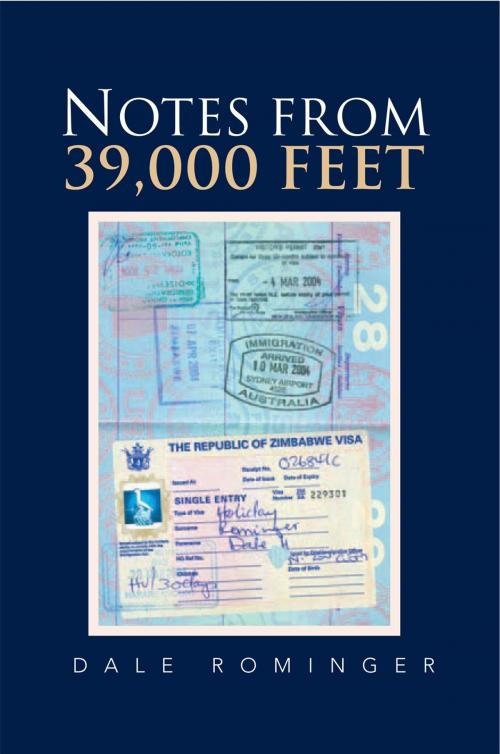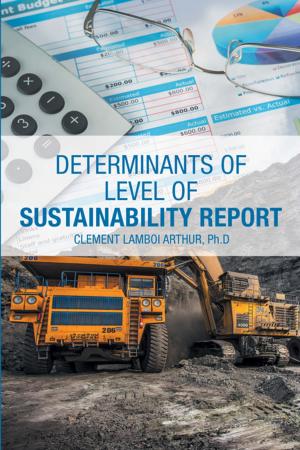| Author: | Dale Rominger | ISBN: | 9781456802462 |
| Publisher: | Xlibris UK | Publication: | November 11, 2010 |
| Imprint: | Xlibris UK | Language: | English |
| Author: | Dale Rominger |
| ISBN: | 9781456802462 |
| Publisher: | Xlibris UK |
| Publication: | November 11, 2010 |
| Imprint: | Xlibris UK |
| Language: | English |
In Notes from 39,000 Feet Dale Rominger has put together a collection of poignant observations from his experiences around the world. With extraordinary clarity, he describes both everyday moments and historical events, including the fall of the Berlin Wall and the first elections in South Africa. In describing personal encounters in places as far afield as Reykjavik and Luanda and reflecting on social and political events from Harare to Seoul, Rominger presents an array of details which most of us would miss and interprets them in such a way that they haunt us long after we finish reading. Perhaps this is the true value of his work; it is not just a fascinating read, it challenges us to question. In the first section of the book, Making Meaning, the Notes are presented in chronological order, beginning in Reykjavik in 1986, passing through places such as Harare, Varanasi, Gaza City, Seoul, Istanbul, Prague, San Salvador and Kingston, and ending in London in 2010. Some Notes are transcriptions of presentations and lectures given at international gatherings and events. Some are journalistic reflections and some sermon-like meditations. Some are directly associated with church work and others are not. Others are reflections on books he came across on his travels. While there is no central theme, there is a background hum that is hard to miss, a hum that hints at ethical, philosophical, theological points of view that make up a system of meaning thoughts, feelings, beliefs, observations, understandings, all of which combine to reveal a way of seeing the world and how we choose to live within it. The last section of the book, Making Believe, is comprised of two fictitious short stories. The first, The Poetry of Being Human, was written after Romingers return from Central America. The second, Martha Goes to Paris, is a response to George W. Bushs rightwing Christian fundamentalist America. While the first places an intense love story within the social and political upheaval, and often tragedy, of Central America in the 1980s, the second is, in Romingers words, An absurd story for an absurd time. At its heart Notes is both an observation of the world we live in and a personal journey. Rominger does not pull his punches and behind almost every word there is a shadow of anger at the injustices he has witnessed in his travels. But the book is also a personal account of the effect such a life can have on a person. He ends the chapter Swanning Around the World or Passing Through the International Non-Places of Planet Earth with these words: Either none of us is special or we are all special. But the point is, the universe, global economics, global warming, international injustice, contemporary slave trade, sex trafficking, disease, poverty, HIV/AIDS, tsunamis, hurricanes, droughts and warlords don't give a damn about us. If God does, he/she/it keeps it a good secret. [I have a] friend in Washington D.C. who...travelled for the church more than I ever have and has been around the world a couple more times than I have. I asked him once if he were happy. He said that he wasnt. That he'd seen too much and knew too much. And like me, he couldnt forget a damn thing. And yet this chapter, as well as many others, is also filled with the laughter and absurdity of life. A quick glance as the bibliography at the end of the book gives the reader some sense of its mood and tone. Rominger cites authors from Woody Allen to Don DeLillo, Chung Hyun Kyung to Paul Ricoeur, Henri Nouwen to Tony Judt. Notes from 39,000 Feet is a tribute to the worlds people in their profound striving for justice and the joy they embrace, whatever the circumstances. It is a testament to the human spirit.
In Notes from 39,000 Feet Dale Rominger has put together a collection of poignant observations from his experiences around the world. With extraordinary clarity, he describes both everyday moments and historical events, including the fall of the Berlin Wall and the first elections in South Africa. In describing personal encounters in places as far afield as Reykjavik and Luanda and reflecting on social and political events from Harare to Seoul, Rominger presents an array of details which most of us would miss and interprets them in such a way that they haunt us long after we finish reading. Perhaps this is the true value of his work; it is not just a fascinating read, it challenges us to question. In the first section of the book, Making Meaning, the Notes are presented in chronological order, beginning in Reykjavik in 1986, passing through places such as Harare, Varanasi, Gaza City, Seoul, Istanbul, Prague, San Salvador and Kingston, and ending in London in 2010. Some Notes are transcriptions of presentations and lectures given at international gatherings and events. Some are journalistic reflections and some sermon-like meditations. Some are directly associated with church work and others are not. Others are reflections on books he came across on his travels. While there is no central theme, there is a background hum that is hard to miss, a hum that hints at ethical, philosophical, theological points of view that make up a system of meaning thoughts, feelings, beliefs, observations, understandings, all of which combine to reveal a way of seeing the world and how we choose to live within it. The last section of the book, Making Believe, is comprised of two fictitious short stories. The first, The Poetry of Being Human, was written after Romingers return from Central America. The second, Martha Goes to Paris, is a response to George W. Bushs rightwing Christian fundamentalist America. While the first places an intense love story within the social and political upheaval, and often tragedy, of Central America in the 1980s, the second is, in Romingers words, An absurd story for an absurd time. At its heart Notes is both an observation of the world we live in and a personal journey. Rominger does not pull his punches and behind almost every word there is a shadow of anger at the injustices he has witnessed in his travels. But the book is also a personal account of the effect such a life can have on a person. He ends the chapter Swanning Around the World or Passing Through the International Non-Places of Planet Earth with these words: Either none of us is special or we are all special. But the point is, the universe, global economics, global warming, international injustice, contemporary slave trade, sex trafficking, disease, poverty, HIV/AIDS, tsunamis, hurricanes, droughts and warlords don't give a damn about us. If God does, he/she/it keeps it a good secret. [I have a] friend in Washington D.C. who...travelled for the church more than I ever have and has been around the world a couple more times than I have. I asked him once if he were happy. He said that he wasnt. That he'd seen too much and knew too much. And like me, he couldnt forget a damn thing. And yet this chapter, as well as many others, is also filled with the laughter and absurdity of life. A quick glance as the bibliography at the end of the book gives the reader some sense of its mood and tone. Rominger cites authors from Woody Allen to Don DeLillo, Chung Hyun Kyung to Paul Ricoeur, Henri Nouwen to Tony Judt. Notes from 39,000 Feet is a tribute to the worlds people in their profound striving for justice and the joy they embrace, whatever the circumstances. It is a testament to the human spirit.















